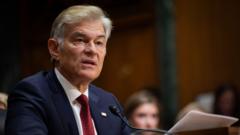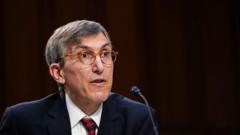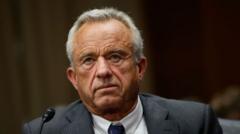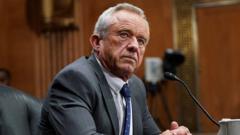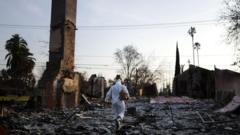The US Department of Health and Human Services is set to cancel $500 million in funding for mRNA vaccine development under Health Secretary Robert F. Kennedy Jr. The cancellation affects 22 significant projects led by major pharmaceuticals, provoking backlash from health experts.**
US Health Department Halts $500 Million mRNA Vaccine Projects Amid Controversy**

US Health Department Halts $500 Million mRNA Vaccine Projects Amid Controversy**
Funding cuts for mRNA vaccine initiatives to address various respiratory viruses come as Health Secretary Robert F. Kennedy Jr. raises safety concerns.**
The US Department of Health and Human Services (HHS) is poised to halt $500 million in funding earmarked for mRNA vaccine projects aimed at combating various respiratory viruses, including COVID-19 and bird flu. This decision, announced by Health Secretary Robert F. Kennedy Jr., has sparked controversy given Kennedy's history of skepticism toward vaccine safety and efficacy.
Kennedy justified the funding withdrawal by asserting that "mRNA technology poses more risks than benefits," and claimed that the vaccines do not adequately protect against upper respiratory infections. His remarks were met with significant criticism from the medical community, which highlighted the crucial role mRNA vaccines played in mitigating the impact of the COVID-19 pandemic—ultimately saving countless lives.
Peter Lurie, a former official from the US Food and Drug Administration (FDA), expressed concern that the US is abandoning a vital tool for future pandemic responses. He noted that the new direction taken by the HHS undermines a promising approach in vaccine technology development.
In statements regarding the funding reassignment, Kennedy asserted that his team had extensively reviewed scientific data and consulted experts. He indicated that the funding would now be directed towards alternative vaccine platforms claimed to be "safer" and less prone to the issues he associates with mRNA technology.
Additionally, Kennedy asserted that the use of mRNA vaccines may lead to advantageous mutations in viruses, potentially prolonging pandemics. However, experts, including Dr. Paul Offit from the Vaccine Education Center, countered these claims by noting that viral mutations occur independently of vaccines' existence. He highlighted the consistent evolution of influenza virus irrespective of vaccination rates.
The HHS elaborated that the Biomedical Advanced Research and Development Authority (BARDA), which manages vaccine development projects, would redirect its focus to platforms with proven safety records. The contrasting methodologies of vaccines—as seen in the traditional inactivated virus approaches versus mRNA mechanisms—further illustrate the spectrum of options available for immunization strategies.
Despite the initial research phase where Moderna and Pfizer's mRNA vaccines demonstrated safety and efficacy through rigorous testing, the cancellation of these projects is perceived as a step backward in the battle against infectious diseases. Experts warn that this funding cessation could jeopardize future readiness for pandemic threats, especially since mRNA vaccines were integral to expediting responses during the COVID crisis.
Since Kennedy took office, he has enacted sweeping changes within HHS, including the dismissal of the entire vaccine advisory committee and a revision of the CDC's immunization schedule, stirring further controversy regarding his stance on public health measures.











